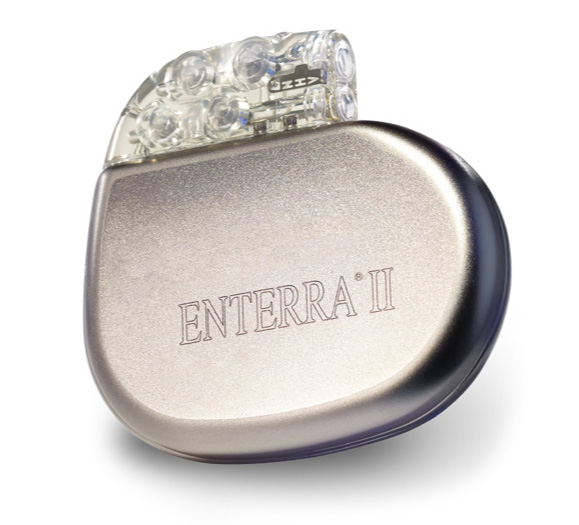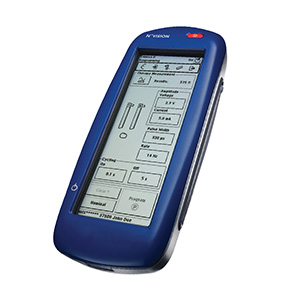Considering Enterra® Therapy
Are you considering Enterra Therapy?
If you think Enterra Therapy may help relieve the chronic nausea and vomiting associated with gastroparesis*, here’s some helpful information to consider.
Answer a few questions to see if you’re a candidate for Enterra Therapy

Steps to receiving Enterra Therapy:
- Get evaluated
Your doctor will choose the appropriate screening tools and diagnostic tests for you. This often includes an initial physical exam, evaluation of medical history, and blood tests. Additionally, to confirm gastroparesis, your doctor may recommend an upper GI endoscopy and a Gastric Scintigraphy Test (Gastric Emptying Test). - Review the results
Sit down with your doctor and carefully review the results from your screenings and evaluations. - Discuss treatment options
Ask your doctor to explain treatment options for your symptoms and/or diagnosis. Make sure to ask questions, review possible side effects, and share any concerns you may have. - Take action
With your doctor’s help, choose the best treatment option for you, and follow your therapy plan—which may include diet modifications, follow-up visits, and other instructions. - Seek prior authorization
If you and your doctor decide that Enterra Therapy is right for you, ask your doctor to obtain a prior authorization from your health insurance company before the implant procedure.
Have questions about Enterra Therapy?
Our Enterra Patient Liaisons are trained professionals with healthcare experience. They are here to help answer your questions.*
Monday through Friday
8am to 5pm Eastern Time.
Enterra Therapy is designed to relieve nausea and vomiting symptoms
While Enterra Therapy is intended to relieve the chronic nausea and vomiting associated with gastroparesis caused by diabetes or unknown causes*, it is not a cure.
Enterra Therapy has 5 randomized control trials completed and over 20 years of clinical research. You should speak with your doctor regarding the clinical data for Enterra Therapy.
Among the patients that do experience relief, results vary. Often a combination of treatment options is necessary to maintain relief.

FDA approved as a Humanitarian Device
Gastric electrical stimulation with the Enterra System was approved by the FDA as a humanitarian use device in 2000.
Reversible
Unlike other surgical options, therapy with gastric electrical stimulation is reversible. Using the external clinician programmer, therapy can be turned on and off without surgery. The device can also be removed from the body.


Enterra Therapy may not be right for everyone
Enterra Therapy is intended to reduce symptoms of chronic, drug-resistant nausea and vomiting associated with gastroparesis caused by diabetes or unknown causes in patients aged 18 to 70 years.
Additionally, here are some other important things to consider:
- Receiving an Enterra System may limit your ability to undergo other medical procedures, including diathermy.
- Some precautions are necessary around certain electrical and medical equipment and when going through theft detection and security screening gates
- Enterra Therapy is not appropriate for patients who aren’t candidates for surgical procedures, anesthesia, or both, because of either physical or mental conditions
- Enterra Therapy has not been evaluated in pregnant women or in patients younger than age 18 or older than age 70
Understand the risks associated with Enterra Therapy
When deciding whether Enterra Therapy is the right option for you, it’s important to understand that there are risks associated with the surgical implantation procedure, the Enterra System Neurostimulator and leads, and gastric electric stimulation therapy.
Complications from Enterra Therapy can include implant site pain, infection, stomach wall perforation, lead penetration, lead obstruction of intestines, lead/device problems, irritation/inflammation, uncomfortable/unwanted stimulation, and tissue damage, among others. For a complete list of adverse events, see Important Safety Information.
The information provided on this site is for general educational purposes only and is not a substitute for professional medical advice, diagnosis or treatment. Always talk to your doctor about the best treatment options for your individual situation.
MKT-D-0003, Rev AA
IMPORTANT SAFETY INFORMATION
Enterra Therapy for treatment of chronic, resistant to medication nausea and vomiting associated with gastroparesis caused by diabetes or an unknown origin in patients aged 18 to 70 years: patients should always discuss potential risks and benefits of the device with their physician.
*HUMANITARIAN DEVICE
Authorized by Federal law for use in the treatment of chronic intractable (drug refractory) nausea and vomiting secondary to gastroparesis of diabetic or idiopathic etiology in patients aged 18 to 70 years. The effectiveness of this device for this use has not been demonstrated. What does this mean?
